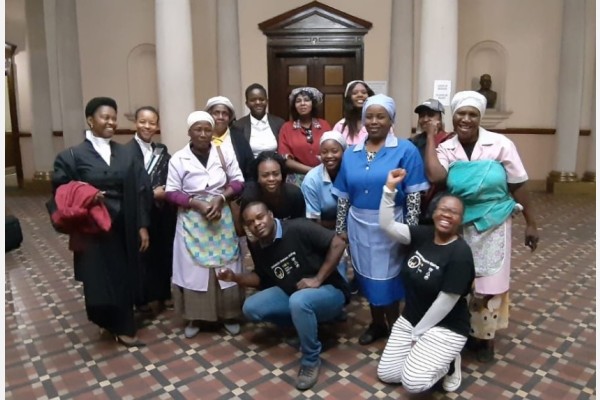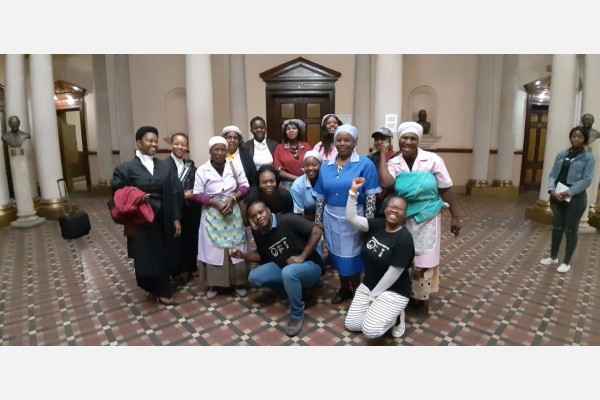Repository of Practices

Migrant Domestic workers and research supporting campaign and litigation for inclusion in the Compensation for Occupational Injuries and Diseases Act
Secondary GCM Objectives
Dates
Type of practice
Summary
In South Africa, about a million people, mainly black women, work as domestic workers, facing various adversities rooted in apartheid and poverty. Migrant domestic workers generally do not mobilise for rights, citing lack of documentation, discrimination, and language barriers as key obstacles to claiming rights. Furthermore, migrant workers have minimal interaction with state institutions, NGOs and migrant-led organisations, minimal trust and reliance on institutions and organisations. Thus, civil society plays a crucial role in advocating for migrant domestic workers' rights, including trade unions, NGOs, migrant-rights organisations, and public interest litigation organisations.
The express exclusion of domestic workers from claiming workers compensation under South African Compensation for Occupational Injury and Illness Act (COIDA) prompted domestic workers, including migrants, to mobilise for legal inclusion through the COIDA Campaign. The COIDA campaign exemplifies how strategic research, legal advocacy, and grassroots organising are critical components to address systemic discrimination and bring about meaningful change.
Part of this campaign for legal inclusion included a 2018 empirical study on the exclusion of domestic workers from COIDA. This research involved in depth interviews with domestic workers, the majority of whom were migrant workers, in order to better understand the types of injury and illness occurring in the context of working in a private home, within particular power and racial dynamics of post-Apartheid. The research paper, “When the Job Hurts” was reported in national media and succeeded in providing awareness of the challenges faced by domestic workers in South Africa. On November 19, 2020, the Constitutional Court of South Africa declared COIDA unconstitutional in the case of Mahlangu v Minister of Compensation, and ordered retrospective compensation for domestic workers. This was an important milestones in recognising and protecting the rights of all domestic workers.
Organizations
Main Implementing Organization(s)
Benefit and Impact
Despite the difficulties migrants encounter in advocating for their rights due to factors such as lack of documentation, discrimination, and language barriers, migrant domestic workers played a central role in the campaign. This is because the exclusion of domestic workers, including migrants, from labour laws like COIDA disenfranchised all workers in the sector regardless of nationality from enjoyment of fundamental labour rights on the grounds of gender, class, and race. This case serves as a powerful example of how international migrants advocate for their rights in South Africa through collective action and national advocacy. By mobilising around the cause of including domestic workers under COIDA, local and migrant workers from countries such as Lesotho, Swaziland, Malawi, and Zimbabwe demonstrated solidarity and unity. This coalition was built upon the principles of feminist 'sisterhood' solidarity, grounded in a shared working-class perspective. Through their campaign, these workers not only fought for their rights but also established a lasting platform for collaboration that extended beyond the constitutional court victory. This enduring coalition signifies the strength and importance of collective action in advancing the rights and protections of marginalised groups, showcasing the potential for meaningful change through solidarity and collaboration.
Key Lessons
Migrants cannot do it alone even if self-organising is involved. Successful mobilisation embroils strong partnerships with progressive local civil society and activists to find common ground for equal enjoyment of constitutional and labour rights. Furthermore, regularising the status of international domestic workers is vital to enable them to effectively advocate for their rights without fear of reprisals such as deportation.
Recommendations(if the practice is to be replicated)
Innovation
Additional Resources
Additional Images
Date submitted:
Disclaimer: The content of this practice reflects the views of the implementers and does not necessarily reflect the views of the United Nations, the United Nations Network on Migration, and its members.
More Related Practices:
- Comité de Cultura de Paz y Derechos Humanos
- Disaggregated Data Action Plan (DDAP) - Statistics Canada
- Immigration, Refugees, and Citizenship Canada’s Use of Gender Based Analysis Plus (GBA Plus)
- Cultural advisories in the services of maternity´s health for the indigenous cross-border community Ngäbe Bugle (WHP)
- Using local-level qualitative research to improve the socio-economic integration and protection of migrants and forcibly displaced people in Peru and Ecuador
Peer Reviewer Feedback:
*References to Kosovo shall be understood to be in the context of United Nations Security Council resolution 1244 (1999).
Newsletter
Subscribe to our newsletter.
